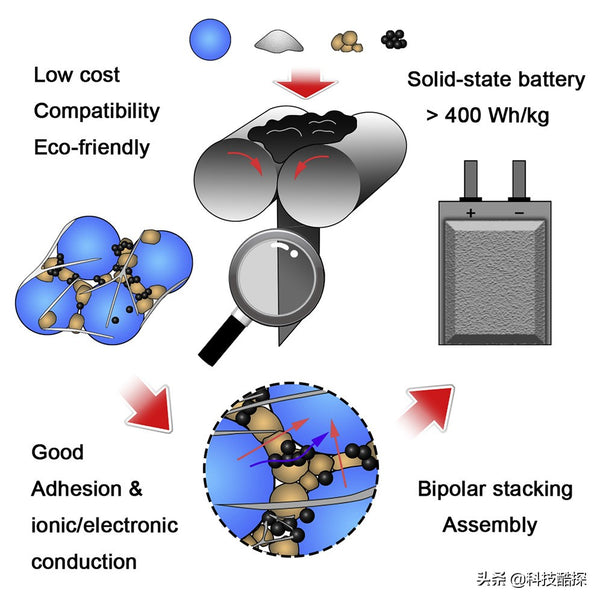The difficulty of a new technology, however, has left Tesla facing a lengthy process to expand production at its battery factory, which Musk candidly admits will be a challenge. "Then, the very difficult part is scaling up production and achieving extreme reliability and safety with batteries," he told the European Battery Conference in November 2020.
This difficult new technology is called dry battery electrode technology. It is a solvent-free method derived from the supercapacitor manufacturing technology that is about to revolutionize the traditional battery industry!
Lithium-ion batteries are the power source of choice for state-of-the-art electric vehicles, and priorities in battery technology are aimed at achieving higher energy levels to compete with gasoline-powered vehicles. However, the energy density of liquid lithium batteries has reached its limit, and it is difficult to break through 300wh/kg.
Therefore, solid-state batteries with higher energy density, faster charging and discharging, better performance at low temperature, and safer solid-state batteries have become the goals pursued by academia and industry.
Dry cell electrode technology offers unique advantages in making energy-intensive solid-state batteries with thicker electrodes and greatly reduced binder content.
In a paper completed by researchers from Tsinghua University and Beijing Institute of Technology and published in the academic journal Matter, the dry battery electrode technology was proven to be environmentally friendly, low-cost, highly compatible, highly productive, and Unique advantages of non-solvent processes such as improved performance.
Dry battery electrode technology has innovated the process route of electrode manufacturing, from the traditional "powder-slurry-film" route to the concise "powder-film" route. Not only can it significantly simplify the manufacturing process to reduce production costs, but it can also rebuild the microstructure in electrodes and improve battery performance.

To aim for an enhanced energy density exceeding 400 Wh/kg, the areal capacity of the electrode should be greater than 4 mAh/cm2, and the thickness of the electrolyte should be less than 50 μm. Dry battery electrode technology can be used to fabricate thin electrolytes and high-performance electrodes due to its high compatibility with solid-state battery materials.
Therefore, it can perfectly solve a series of difficulties brought by the realization of high energy density batteries, and their combination will bring new opportunities to break the bottleneck of batteries from laboratory-scale manufacturing to pilot-scale and even batch industrialization.
Not only that, it also reduces the cost of battery manufacturing as dry battery manufacturing skips the traditional, complex battery manufacturing steps involving chemical slurries.
Tesla's 4680 battery uses dry cell electrode technology, which is why it has attracted worldwide attention, and it has about 5 times the energy of the smaller 2170 battery! Get the same power and range with a lower number of new batteries for less!
Up to now, for more than a year, Tesla has cooperated with Panasonic, and the technological breakthrough is a difficult process.
According to a recent Teslarati article, Kazuo Tadanobu, CEO of Panasonic's energy division, said: "It's not just about making bigger batteries, it's not as easy as you think. This development process consumes a lot of energy."
But, the good news is that they finally got over these hurdles! Tesla produced its millionth 4680 battery in January of this year. Full production of the new batteries will not begin until next year, when they will be used in new electric trucks.
These new batteries increase the range of electric vehicles by 54%! The ultra-long cruising range of electric vehicles is coming...
Two days ago, Samsung announced the start of construction of its solid-state battery pilot line, and their goal is to achieve market-leading research results and production technology for solid-state batteries.
Solid-state battery technology is one of the hottest topics in the battery industry right now. With continuous breakthroughs in technology, we are very hopeful to see next-generation batteries with significantly improved performance and safety!
Therefore, it can perfectly solve a series of difficulties brought by the realization of high energy density batteries, and their combination will bring new opportunities to break the bottleneck of batteries from laboratory-scale manufacturing to pilot-scale and even batch industrialization.
Not only that, it also reduces the cost of battery manufacturing as dry battery manufacturing skips the traditional, complex battery manufacturing steps involving chemical slurries.
Tesla's 4680 battery uses dry cell electrode technology, which is why it has attracted worldwide attention, and it has about 5 times the energy of the smaller 2170 battery! Get the same power and range with a lower number of new batteries for less!
Up to now, for more than a year, Tesla has cooperated with Panasonic, and the technological breakthrough is a difficult process.
According to a recent Teslarati article, Kazuo Tadanobu, CEO of Panasonic's energy division, said: "It's not just about making bigger batteries, it's not as easy as you think. This development process consumes a lot of energy."
But, the good news is that they finally got over these hurdles! Tesla produced its millionth 4680 battery in January of this year. Full production of the new batteries will not begin until next year, when they will be used in new electric trucks.
These new batteries increase the range of electric vehicles by 54%! The ultra-long cruising range of electric vehicles is coming...
Two days ago, Samsung announced the start of construction of its solid-state battery pilot line, and their goal is to achieve market-leading research results and production technology for solid-state batteries.
Solid-state battery technology is one of the hottest topics in the battery industry right now. With continuous breakthroughs in technology, we are very hopeful to see next-generation batteries with significantly improved performance and safety!

